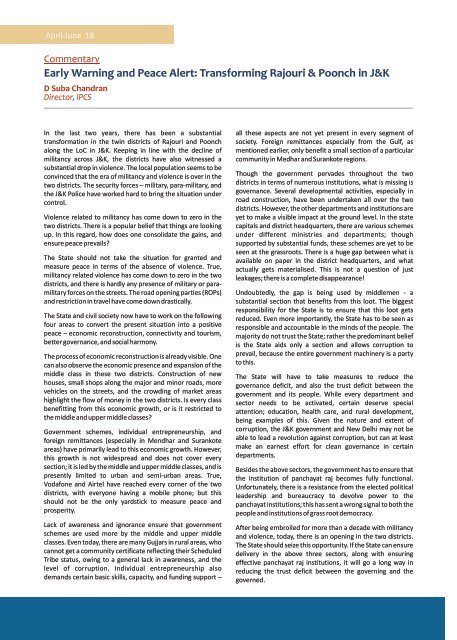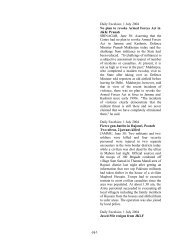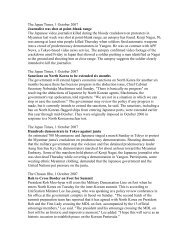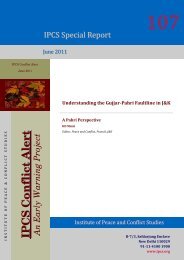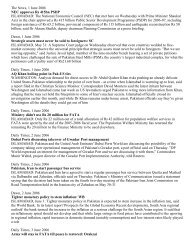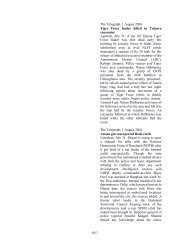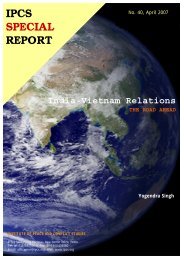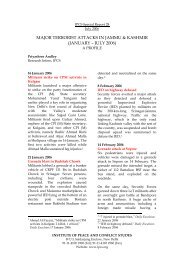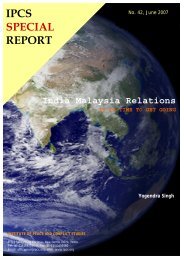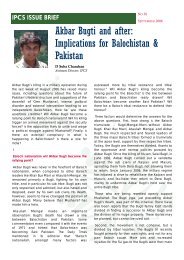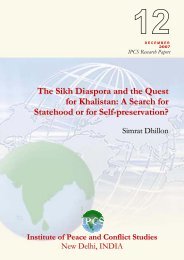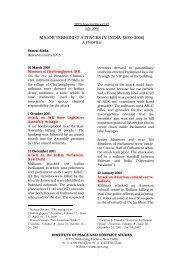April-June 2013 - Institute of Peace and Conflict Studies
April-June 2013 - Institute of Peace and Conflict Studies
April-June 2013 - Institute of Peace and Conflict Studies
Create successful ePaper yourself
Turn your PDF publications into a flip-book with our unique Google optimized e-Paper software.
<strong>April</strong>-<strong>June</strong> 18<br />
Commentary<br />
Early Warning <strong>and</strong> <strong>Peace</strong> Alert: Transforming Rajouri & Poonch in J&K<br />
D Suba Ch<strong>and</strong>ran<br />
Director, IPCS<br />
In the last two years, there has been a substantial<br />
transformation in the twin districts <strong>of</strong> Rajouri <strong>and</strong> Poonch<br />
along the LoC in J&K. Keeping in line with the decline <strong>of</strong><br />
militancy across J&K, the districts have also witnessed a<br />
substantial drop in violence. The local population seems to be<br />
convinced that the era <strong>of</strong> militancy <strong>and</strong> violence is over in the<br />
two districts. The security forces – military, para-military, <strong>and</strong><br />
the J&K Police have worked hard to bring the situation under<br />
control.<br />
Violence related to militancy has come down to zero in the<br />
two districts. There is a popular belief that things are looking<br />
up. In this regard, how does one consolidate the gains, <strong>and</strong><br />
ensure peace prevails?<br />
The State should not take the situation for granted <strong>and</strong><br />
measure peace in terms <strong>of</strong> the absence <strong>of</strong> violence. True,<br />
militancy related violence has come down to zero in the two<br />
districts, <strong>and</strong> there is hardly any presence <strong>of</strong> military or paramilitary<br />
forces on the streets. The road opening parties (ROPs)<br />
<strong>and</strong> restriction in travel have come down drastically.<br />
The State <strong>and</strong> civil society now have to work on the following<br />
four areas to convert the present situation into a positive<br />
peace – economic reconstruction, connectivity <strong>and</strong> tourism,<br />
better governance, <strong>and</strong> social harmony.<br />
The process <strong>of</strong> economic reconstruction is already visible. One<br />
can also observe the economic presence <strong>and</strong> expansion <strong>of</strong> the<br />
middle class in these two districts. Construction <strong>of</strong> new<br />
houses, small shops along the major <strong>and</strong> minor roads, more<br />
vehicles on the streets, <strong>and</strong> the crowding <strong>of</strong> market areas<br />
highlight the flow <strong>of</strong> money in the two districts. Is every class<br />
benefitting from this economic growth, or is it restricted to<br />
the middle <strong>and</strong> upper middle classes?<br />
Government schemes, individual entrepreneurship, <strong>and</strong><br />
foreign remittances (especially in Mendhar <strong>and</strong> Surankote<br />
areas) have primarily lead to this economic growth. However,<br />
this growth is not widespread <strong>and</strong> does not cover every<br />
section; it is led by the middle <strong>and</strong> upper middle classes, <strong>and</strong> is<br />
presently limited to urban <strong>and</strong> semi-urban areas. True,<br />
Vodafone <strong>and</strong> Airtel have reached every corner <strong>of</strong> the two<br />
districts, with everyone having a mobile phone; but this<br />
should not be the only yardstick to measure peace <strong>and</strong><br />
prosperity.<br />
Lack <strong>of</strong> awareness <strong>and</strong> ignorance ensure that government<br />
schemes are used more by the middle <strong>and</strong> upper middle<br />
classes. Even today, there are many Gujjars in rural areas, who<br />
cannot get a community certificate reflecting their Scheduled<br />
Tribe status, owing to a general lack in awareness, <strong>and</strong> the<br />
level <strong>of</strong> corruption. Individual entrepreneurship also<br />
dem<strong>and</strong>s certain basic skills, capacity, <strong>and</strong> funding support –<br />
all these aspects are not yet present in every segment <strong>of</strong><br />
society. Foreign remittances especially from the Gulf, as<br />
mentioned earlier, only benefit a small section <strong>of</strong> a particular<br />
community in Medhar <strong>and</strong> Surankote regions.<br />
Though the government pervades throughout the two<br />
districts in terms <strong>of</strong> numerous institutions, what is missing is<br />
governance. Several developmental activities, especially in<br />
road construction, have been undertaken all over the two<br />
districts. However, the other departments <strong>and</strong> institutions are<br />
yet to make a visible impact at the ground level. In the state<br />
capitals <strong>and</strong> district headquarters, there are various schemes<br />
under different ministries <strong>and</strong> departments; though<br />
supported by substantial funds, these schemes are yet to be<br />
seen at the grassroots. There is a huge gap between what is<br />
available on paper in the district headquarters, <strong>and</strong> what<br />
actually gets materialised. This is not a question <strong>of</strong> just<br />
leakages; there is a complete disappearance!<br />
Undoubtedly, the gap is being used by middlemen - a<br />
substantial section that benefits from this loot. The biggest<br />
responsibility for the State is to ensure that this loot gets<br />
reduced. Even more importantly, the State has to be seen as<br />
responsible <strong>and</strong> accountable in the minds <strong>of</strong> the people. The<br />
majority do not trust the State; rather the predominant belief<br />
is the State aids only a section <strong>and</strong> allows corruption to<br />
prevail, because the entire government machinery is a party<br />
to this.<br />
The State will have to take measures to reduce the<br />
governance deficit, <strong>and</strong> also the trust deficit between the<br />
government <strong>and</strong> its people. While every department <strong>and</strong><br />
sector needs to be activated, certain deserve special<br />
attention; education, health care, <strong>and</strong> rural development,<br />
being examples <strong>of</strong> this. Given the nature <strong>and</strong> extent <strong>of</strong><br />
corruption, the J&K government <strong>and</strong> New Delhi may not be<br />
able to lead a revolution against corruption, but can at least<br />
make an earnest effort for clean governance in certain<br />
departments.<br />
Besides the above sectors, the government has to ensure that<br />
the institution <strong>of</strong> panchayat raj becomes fully functional.<br />
Unfortunately, there is a resistance from the elected political<br />
leadership <strong>and</strong> bureaucracy to devolve power to the<br />
panchayat institutions; this has sent a wrong signal to both the<br />
people <strong>and</strong> institutions <strong>of</strong> grass root democracy.<br />
After being embroiled for more than a decade with militancy<br />
<strong>and</strong> violence, today, there is an opening in the two districts.<br />
The State should seize this opportunity. If the State can ensure<br />
delivery in the above three sectors, along with ensuring<br />
effective panchayat raj institutions, it will go a long way in<br />
reducing the trust deficit between the governing <strong>and</strong> the<br />
governed.


